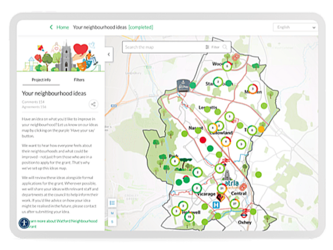Weighing it up
Among the reading matter for MPs to peruse over the summer – whether or not their traditional recess is cancelled – will be the final report from Climate Assembly UK (CAUK), the national citizens’ assembly that began in a Birmingham hotel in January and culminated, under lockdown, in participants’ homes in May. Commissioned by six House of Commons select committees, and run by public participation charity Involve, the assembly sought to address how the UK could best achieve net-zero carbon emissions by 2030.
The climate assembly was high profile – environmentalist David Attenborough attended its first session – and its 110 participants were highly engaged. Yet, for all the time and investment that went into it, its success will be judged, ultimately, on whether the government acts on its findings. At the time of writing, we don’t know whether the report will even be debated in parliament.
Citizens’ assemblies involve a representative sample of people deliberating and reflecting on complex or sensitive issues, gathering and evaluating information, in a series of concentrated sessions that are informed by experts and facilitated by unbiased moderators. The idea is to deepen democracy, give citizens a say in how they are governed, and build understanding among politicians about the trade-offs people are prepared to make – which, in turn, informs and gives credibility to policy decisions.
CAUK is one of several citizens’ assemblies springing up around Europe. Much of the new interest stems from the success of an assembly in Ireland, which ushered in changes including same-sex marriage and abortion – contentious issues that had proved impossible for government on its own to resolve.
Although they seem like the public engagement tool du jour, citizens’ assemblies are not new. Some of the core tenets – including ‘deliberative democracy’ – hail from ancient Athens: in 431BC the Greek statesman Pericles judged that “[public discussion] is an indispensable preliminary to any wise action at all”.
Basic principles
The notion that everyday citizens should participate in public decision-making was revived in the early 1970s by American Ned Crosby and German Peter Dienel, who created – independently of each other – the ‘citizens’ jury’ process and ‘planning cells’ respectively. They only found out about each other’s work 14 years later, and became lifelong friends and collaborators. While the basic principles remain sacrosanct – such as representative samples, neutral moderation, small group discussion, and the time and environment to deliberate properly – both approaches have evolved over the years. For example, the Nexus Institute, run by Dienel’s son Hans-Liudger Dienel, now uses the internet to broaden public awareness and understanding of the process.
The UK is a latecomer to the most recent iteration of the citizens’ assembly party – because, suggests Viki Cooke, founding partner of international insight and strategy consultancy BritainThinks, of “culture and political commitment – it’s a long time in this country since national policy issues were looked at through this lens”. But it seems like an idea whose time has come.
Polly Mackenzie, chief executive of cross-party think tank Demos, says: “Many of the big challenges we are facing are not simplistically responsive to a single expert answer: what matters is what we can agree on.” What’s more, citizens’ assembly advocates could be pushing at an open door. In its manifesto, the Conservative party pledged to establish a constitution, democracy and rights commission, “to restore trust in our institutions and in how our democracy operates”.
However, some researchers who have been using deliberative tools and techniques with national and local government clients for many years, are concerned that some of the new purveyors of deliberative democracy are trying to prescribe – and even brand – tools and methodologies that should, arguably, be part of a generic approach.
“A focus on ‘the means’ rather than ‘the end’ risks the very democracy, empowerment and participation that deliberative approaches should be fostering,” says independent consultant and MRS fellow Paul Vittles. “The methodology should serve the process, not drive it.”
Vittles says that a healthy democracy needs both wide participation and deep deliberation, and that online forums can complement traditional face-to-face interaction – something “the fundamentalists in the ‘deliberative democracy wave’”, as he calls them, resisted until Covid-19 forced them to change. He points out that Climate Assembly UK sent out invitations to 30,000 randomly chosen households, and 1,500 responded asking to be considered. The fact that 1,400 people were effectively rejected by CAUK, which sank its £520,000 budget into an assembly for 110 people, makes it, Vittles says, “the worst example so far of depth of deliberation at the expense of breadth of participation”.
The narrow focus by the increasingly influential Sortition Foundation – which was established in 2015, on the ancient Athenian practice of sortition (taking a random selection of citizens and sorting them into a representative sample) – risks devaluing alternative legitimate methods used by researchers for decades, adds Vittles. “The national climate assemblies in France, Scotland and Ireland didn’t use postal sortition.
In France, Harris did random phone sampling and, in Ireland, they took 60 random locations and sent interviewers door to door with quotas to reflect the population profile, to get a representative sample.”
A balanced approach
While ‘fundamentalists’ debate the finer methodological and philosophical points of citizens’ assemblies, research companies are, by and large, pragmatic.
“It is important to have standards, quality thresholds, a framework and principles to work to, if the process is to be respected, but there needs to be a balance,” says Suzanne Hall, research director at Ipsos Mori. Rob Francis, head of central and local government at research and engagement consultancy Traverse, agrees: “The methodology is very important, but it is also right to be able to challenge the criteria, rather than following them slavishly for the sake of orthodoxy.”
Cooke points out that “one of the principles of deliberative methods is their effect on the decisions ultimately taken”. Mackenzie believes the reason the government hasn’t adopted any of the recommendations made by the citizens’ assembly on social care in 2018 is that it was “commissioned by the wrong people” – not the government, but MPs, who lack the power to take things forward.
Even Climate Assembly UK is not guaranteed success according to these criteria – so it’s not surprising that some agencies find working at a local council level, or for an individual government department, more rewarding. “There is a lot of interesting work outside the big, high-profile, complex, public policy issues,” says Cooke. She cites a recent project the agency did for the National Infrastructure Commission (NIC) on road congestion, which was designed to gauge people’s attitudes to different policy levers and help the NIC to understand whether deliberation was a good method to use in future.
Success can be measured in a variety of ways. NatCen Social Research conducted what it claims to have been the UK’s first online deliberative poll using video-conferencing software last year. Its aim was to determine people’s views on the future of Britain and governance post-Brexit, and whether – and why – those views changed as a result of the deliberations. It was largely an experiment to find out whether the conditions needed for effective deliberation could be replicated online.
Ceri Davies, who leads NatCen’s programme of deliberative research on citizen engagement in policy-making and democratic innovation, explains that the agency essentially replicated online what it typically does in a physical location. It recruited 320 people through a random probability survey among its own panel of 3,000 people, drawn from the British Social Attitudes survey. It ran a feasibility study on what software to use, decided on Zoom, and then did “lots of development work” to build technological capability in its own team and participants. It sent out a pre-session questionnaire to gauge opinions on the topics being discussed – immigration, food policy and consumer rights – and followed that with briefing materials on the topics. The event took place over two days on the hottest weekend in June.
NatCen learned a great deal from the experiment. For example, the attrition rate was around 43%, compared with the 20-25% typical of face-to-face deliberative polls. The weather undoubtedly had an effect, but the agency also recognised that it is easier not to turn up to an online event than it is to a physical one where hotel and travel costs have been paid.
On the positive side, people were willing and able to deliberate meaningfully online, in a sustained way, with some saying they enjoyed being involved from the comfort of their own homes.
NatCen is refining its approach but feels confident to proceed with online deliberation and polling now it has, says Davies, “proof of concept that it is a way of having conversations at scale”.
Issues that NatCen and others need to grapple with include ‘digital exclusion’ and the tiring nature of staring into a screen all day. Shorter sessions, spread over more days, could be part of the answer, as could ‘asynchronous’ solutions, where individuals post thoughts over an extended period – although this challenges the view that all participants need to be in the same ‘room’ at the same time.
Additionally, while digital deliberation may, in the short term at least, exclude some people, it is likely to include others who find it difficult to attend a physical forum.
Navigating trade-offs
If we accept that citizens’ assemblies and deliberative approaches are “a way of thinking, an approach, not a brand”, in Cooke’s words, they can be used to address a range of challenges – even in the commercial arena, albeit to a limited extent given the guiding principle that they contribute to the greater good.
BritainThinks and Traverse both do deliberative research for clients in the energy sector, helping them resolve issues such as how to fund innovations that won’t necessarily benefit today’s customers.
Francis says: “A fast-fashion brand could, justifiably, use the technique to work out how to become more sustainable, because consumers are a big part of the solution to climate change.”
Mackenzie describes citizens’ assemblies as “a useful supplement in representative democracy”, adding that, had they been used to determine exactly what question to pose in the Brexit referendum, we would have been saved three years of misery after the vote “trying to work out what it meant”.
Recovery from the Covid-19 crisis is an ideal opportunity for a citizens’ conversation, given the tensions and trade-offs to be navigated as we emerge – climate change versus airline bailouts, and privacy versus keeping infection rates low being two obvious examples.
Current polls – including one by the Scottish government – are essentially about taking the temperature, says Francis, who believes it would be “an opportunity missed if we don’t have proper deliberative conversations, at a local or national level, over the next few months, and feed the results into what will be, as a result, a far richer and more nuanced response to how we get out of this crisis.”
Some people advocate legislating for citizens’ assemblies, but others are wary of institutionalising ‘methodological bias’. Valuable though they are, they are not, says Mackenzie, a panacea: “We also need to find ways for much more mass participation and openness around the choices that government makes.”
In politics, as in business, you have to decide what problem you need to fix before selecting the best tool – or, typically, mix of tools – to do it. Seizing the newest, or shiniest, can be a mistake.
“Sometimes you need a hammer, sometimes a screwdriver – but if you try to do the job with the wrong tool you’re going to end up with a lot of broken things,” says Mackenzie.
Oxford citizens’ assembly on climate change
In January 2019, Oxford City Council declared a climate emergency and commissioned Ipsos Mori to recruit, coordinate and conduct a citizens’ assembly to help determine how to tackle it at a local level.
Fifty participants spent two weekends deliberating the following question: “The UK has legislation to reach net zero by 2050. Should Oxford be more proactive and seek to achieve net zero sooner than 2050?” The council was keen to understand the sacrifices and trade-offs people would make to achieve net zero, so the deliberation focused on five areas over which it had some control – waste reduction, buildings, transport, biodiversity and offsetting, and renewable energy. Participants listened to expert presentations, deliberated in small breakout and larger plenary sessions, and voted on key issues.
They were overwhelmingly in favour of Oxford striving for net zero before 2050, but there was little consensus on an alternative date. The scale of the problem and need for change were greater than they had anticipated, but they felt rapid change was possible. There had been low awareness of existing initiatives, and people felt more optimistic once they heard about these. They also anticipated civic pride from Oxford becoming a leader in the climate crisis.
However, they felt the burden of change was being placed on individuals, and wanted to know about the role of large businesses and government.
These findings provided signposts for action, and the most tangible measure of success was that Oxford City Council set a climate emergency budget that commits more than £1m additional operational funding and £18m of capital investment to address the climate emergency.
This article was first published in the July 2020 issue of Impact.

We hope you enjoyed this article.
Research Live is published by MRS.
The Market Research Society (MRS) exists to promote and protect the research sector, showcasing how research delivers impact for businesses and government.
Members of MRS enjoy many benefits including tailoured policy guidance, discounts on training and conferences, and access to member-only content.
For example, there's an archive of winning case studies from over a decade of MRS Awards.
Find out more about the benefits of joining MRS here.













0 Comments